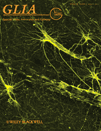
GLIA
metrics 2024
Elevating the Science of Neuroscience Since 1988
Introduction
GLIA is a premier journal in the fields of Cellular and Molecular Neuroscience and Neurology, published by WILEY. With an impressive track record since its inception in 1988, GLIA has become an essential resource for researchers and professionals interested in the complexities of glial cells and their roles in the nervous system. Featuring articles that encompass a wide range of topics, from basic research to clinical implications, the journal is committed to advancing our understanding of neurological functions and disorders. Although not an open access publication, GLIA maintains its reputation with a significant impact factor, consistently ranking in the Q1 category as noted in 2023 Scopus rankings. With its comprehensive scope and high-quality peer-reviewed content, GLIA serves as a vital platform for disseminating groundbreaking research in the ever-evolving landscape of neuroscience.
Metrics 2024
 2.52
2.52 5.40
5.40 6.60
6.60 186
186Metrics History
Rank 2024
IF (Web Of Science)
JCI (Web Of Science)
Quartile History
Similar Journals

Molecular Brain
Illuminating the Pathways of Molecular Brain ResearchMolecular Brain is a prestigious open-access journal published by BMC, dedicated to advancing the field of neuroscience with a particular focus on cellular and molecular mechanisms. Since its inception in 2008, the journal has been committed to disseminating high-quality research that explores the intricate workings of the brain, particularly in areas related to cellular and molecular neuroscience. Located in the heart of London, England, Molecular Brain has garnered significant recognition in the academic community, boasting a 2023 categorization in the Q2 quartile for both Cellular and Molecular Neuroscience and Molecular Biology, reflecting its growing influence and relevance in these fields. With its Scopus ranks placing it in the top 32% and 38% of its respective categories, the journal serves as an essential platform for researchers, professionals, and students alike, encouraging collaboration and knowledge-sharing through its accessible online format.

NEUROSCIENCE
Unveiling the complexities of the nervous system.NEUROSCIENCE, published by PERGAMON-ELSEVIER SCIENCE LTD, has established itself as a reputable journal in the field of neuroscience since its inception in 1976, continuing its contributions through 2024. With a Category Quartile ranking of Q2 in Neuroscience (miscellaneous) and a Scopus Rank of #41 out of 113, this journal represents a critical platform for the dissemination of innovative research and insights. Although it currently does not offer open access options, NEUROSCIENCE aims to advance our understanding of the nervous system by publishing high-quality original research, reviews, and methodological articles, thereby engaging a comprehensive audience of researchers, professionals, and students alike. With an impact factor that reflects its significance in the scientific community, this journal remains a go-to source for cutting-edge discoveries and scholarly discussions in the dynamic field of neuroscience.

CELLULAR AND MOLECULAR NEUROBIOLOGY
Pioneering Insights into Cellular and Molecular Processes.CELLULAR AND MOLECULAR NEUROBIOLOGY, published by SPRINGER/PLENUM PUBLISHERS, stands as a significant contributor to the fields of cell biology and neuroscience, holding a distinguished position in the academic community with an impact factor that places it in the Q2 category for both Cell Biology and Cellular and Molecular Neuroscience, along with Q1 in Medicine (miscellaneous). Since its inception in 1981, this journal has provided a critical platform for innovative research and thought-provoking reviews, fostering a deeper understanding of complex neurobiological mechanisms. The journal’s rigorous peer-review process ensures the publication of high-quality manuscripts that offer valuable insights into cellular processes and neural functions. With a commitment to advancing knowledge and promoting collaboration among researchers, CELLULAR AND MOLECULAR NEUROBIOLOGY remains an essential resource for professionals and students alike, looking to stay updated on the latest developments in neurobiology.

NATURE NEUROSCIENCE
Advancing the Frontiers of Neuroscience ResearchNATURE NEUROSCIENCE is a premier journal published by NATURE PORTFOLIO, focusing on cutting-edge research in the field of neuroscience. With an esteemed impact factor that reflects its significance in the academic community, this journal occupies an exceptional place in the 2023 Q1 category for neuroscience (miscellaneous) and boasts a leading Scopus rank of #1 out of 113 in general neuroscience, placing it within the top 1st percentile. Since its inception in 1998, NATURE NEUROSCIENCE has consistently delivered high-quality, peer-reviewed articles that contribute to our understanding of the nervous system, driving innovation and scholarship across disciplines. Although it does not offer open access, the journal remains a vital resource for researchers, professionals, and students seeking to stay at the forefront of neuroscientific discovery and discussion. Its editorial commitment to excellence ensures that it continually shapes the trajectory of neuroscience research well into 2024 and beyond, making it an indispensable asset for anyone passionate about the brain and its complexities.

MOLECULAR AND CELLULAR NEUROSCIENCE
Illuminating Pathways in Cellular NeuroscienceMOLECULAR AND CELLULAR NEUROSCIENCE, published by Academic Press Inc Elsevier Science, is a pivotal journal dedicated to the expansive fields of Cellular and Molecular Neuroscience, providing a platform for the dissemination of innovative research and theoretical advancements since its establishment in 1990. With an ISSN of 1044-7431 and a commitment to high scholarly standards, this journal holds a notable Q2 ranking in key categories such as Cell Biology and Molecular Biology, highlighting its significant impact within the academic community. Although currently not an Open Access journal, it offers a wealth of insightful contributions aimed at fostering understanding and collaboration among researchers, professionals, and students. The journal's ongoing publication trajectory through to 2024 guarantees a continuous flow of cutting-edge research that is critical for addressing complex questions in neuroscience. As it plays a crucial role in advancing our understanding of molecular mechanisms underpinning neural function and pathology, MOLECULAR AND CELLULAR NEUROSCIENCE remains an essential reference for anyone invested in these dynamic fields.

NEUROPATHOLOGY AND APPLIED NEUROBIOLOGY
Unraveling Complexities in Neurology and PathologyNEUROPATHOLOGY AND APPLIED NEUROBIOLOGY is a premier journal dedicated to advancing the understanding of the intricate relationships between pathology and neurobiology. Published by Wiley since 1975, this journal has established itself as a crucial resource for researchers, clinicians, and students interested in the latest insights and developments in the fields of pathology, neurology, and neuroscience. With an impressive history of convergence extending to 2024, it boasts a Q1 ranking in multiple categories including Histology, Neurology, and Pathology, reflecting its high impact and reputation in the academic community. Additionally, it ranks 18th out of 208 in Pathology and Forensic Medicine with a remarkable 91st percentile, signifying its relevance and influence in medical research. While not open access, this journal provides valuable content that contributes significantly to the ongoing discourse in neurobiological advancements and is a vital reference for those engaged in this dynamic field.

EXPERIMENTAL NEUROLOGY
Pioneering Discoveries in Neurology Since 1959.EXPERIMENTAL NEUROLOGY is a premier academic journal published by Academic Press Inc, Elsevier Science, focusing on advancements in the fields of Developmental Neuroscience and Neurology. With an impressive Impact Factor and ranked in the Q1 quartile of both categories—positioning it among the top-tier journals—this publication has established itself as a vital resource for researchers, clinicians, and students alike. Since its inception in 1959, it has fostered the dissemination of cutting-edge research and innovative approaches to understanding neurological function and related disorders. While EXPERIMENTAL NEUROLOGY currently operates under a subscription access model, its rich archives and ongoing contributions to the field continue to inspire and inform the next generation of neurobiologists. The journal also boasts a high ranking in Scopus, placing fourth in Developmental Neuroscience and twentieth in Neurology, indicating its robust influence and scholarly significance. For those committed to advancing knowledge in these critical areas, EXPERIMENTAL NEUROLOGY is an indispensable platform for inquiry and discovery.

MOLECULAR IMMUNOLOGY
Elevating Research in Immunology and Molecular DynamicsMOLECULAR IMMUNOLOGY, published by Pergamon-Elsevier Science Ltd in the United Kingdom, is a highly regarded journal in the fields of Immunology and Molecular Biology. With a focus on advancing the understanding of the immune system at the molecular level, the journal has been a critical resource since its inception in 1975. The journal is currently listed in the second quartile (Q2) of its category as per the 2023 rankings, indicating its substantial impact in both Immunology and Molecular Biology research. Researchers and professionals benefit from the journal's rigorous peer-review process and its commitment to publishing high-quality original research, reviews, and methodological studies that explore the intricate dynamics of immune responses. Although it does not currently offer an open access option, MOLECULAR IMMUNOLOGY remains an essential platform for scholars, emphasizing the significance of molecular interactions within the immune system and their implications in health and disease.

CNS & Neurological Disorders-Drug Targets
Unraveling the Complexities of the Central Nervous SystemCNS & Neurological Disorders-Drug Targets is a distinguished journal that focuses on contemporary research and advancements in the realms of neurology, pharmacology, and drug development. Published by Bentham Science Publishers, this journal serves as an essential platform for researchers, professionals, and students interested in the intricate workings of the central nervous system and the evolving strategies to target neurological disorders through pharmacological innovations. With a robust impact factor reflecting its academic relevance, CNS & Neurological Disorders-Drug Targets is categorized in the Q2 quartile for both Medicine (miscellaneous) and Pharmacology, and Q3 for Neuroscience in the 2023 rankings. The journal's Scopus rankings further reinforce its authority, positioning it within the top half of its categories. Operating out of the United Arab Emirates, the journal has been a loyal contributor to the scientific discourse since its inception in 2006 and will continue until at least 2024, ensuring a dynamic channel for the latest findings and reviews in this vital field. As an open-access publication, it prioritizes accessibility, thus fostering a wider impact among scholars and practitioners alike, making it a valuable resource for all stakeholders in neurological and pharmacological research.

Frontiers in Cellular Neuroscience
Advancing the frontiers of neuroscience research.Frontiers in Cellular Neuroscience, published by FRONTIERS MEDIA SA, is an esteemed open-access journal operating out of Switzerland that has been at the forefront of disseminating cutting-edge research since its inception in 2007. With a focus on the cellular and molecular aspects of neuroscience, this journal addresses fundamental questions and advances our understanding of the nervous system, making it indispensable for researchers, professionals, and students in the field. As of 2023, it is ranked in the Q2 category for Cellular and Molecular Neuroscience, positioned at rank #27 out of 97 in Scopus, and boasting a notable 72nd percentile ranking, reflecting its impactful contributions to the discipline. The journal's commitment to open access enhances the accessibility of vital research findings, promoting knowledge sharing and collaboration. Researchers looking for a platform to publish groundbreaking neuroscience research will find Frontiers in Cellular Neuroscience an ideal venue for reaching a wide audience.